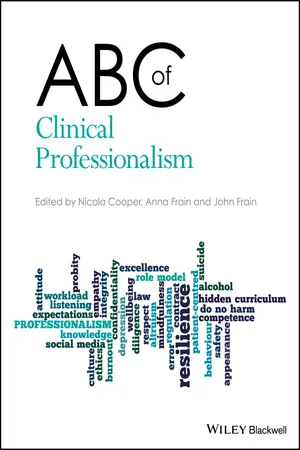
- English
- ePUB (mobile friendly)
- Available on iOS & Android
ABC of Clinical Professionalism
About This Book
Clinical professionalism is a set of values, behaviours and relationships which underpins the public's trust in healthcare providers both as individuals and organisations. 'First, do no harm' is expressed most clearly today in the patient safety movement and the imperative for transparency and candour in the delivery of healthcare. Professional conduct is essential for safe and high quality clinical care.
The ABC of Clinical Professionalism considers recent evidence on how healthcare practitioners maintain professionalism including how values are developed and affected by the working environment, the challenges of maintaining personal and organisational resilience and the ethical and regulatory framework in which practice is conducted. Topics covered include:
- Acquiring and developing professional values
- Patient-centred care
- Burnout and resilience
- Confidentiality and social media
- The culture of healthcare
- Ensuring patient safety
- Leadership and collaboration
- Ethical and legal aspects of professionalism
- Teaching and assessing professionalism
- Regulation of healthcare professionals
The chapter authors come from a range of countries and have experience of working in multidisciplinary clinical teams, research, and in the training of future healthcare practitioners including their development as professionals.
Frequently asked questions
Information
Chapter 1
Why Clinical Professionalism Matters
OVERVIEW
- Clinical professionalism is founded on respect for the dignity of each human person.
- Each health professional, health service provider, professional body and regulator should ‘first, do no harm’ to those in their care.
- Modern professionalism is a partnership of patient and professional in an organisational framework that supports the safety and well-being of both parties.
- A duty of care acts to protect patients from a potentially unequal relationship with healthcare providers and professionals.
- A culture of rudeness and incivility in healthcare fosters cynicism and burnout in healthcare professionals and damages patient care.
- Clinical professionalism underpins safe patient care and addresses the human factors that contribute to clinical errors.
Introduction
Box 1.1 An ancient Greek definition of happiness.
‘The good of man is the active exercise of his soul’s faculties in conformitywith excellence or virtue, or if there be several human excellences or virtues,in conformity with the best and most perfect among them'.Aristotle (384–322 BCE), Nicomachean Ethics
Box 1.2 The physicians' charter.
- Fundamental principles:
- Principle of primacy of patient welfare.
- Principle of patient autonomy.
- Principle of social justice.
- A set of professional responsibilities:
- Commitment to professional competence.
- Commitment to honesty with patients.
- Commitment to patient confidentiality.
- Commitment to maintaining appropriate relations with patients.
- Commitment to improving quality of care.
- Commitment to improving access to care.
- Commitment to a just distribution of finite resources.
- Commitment to scientific knowledge.
- Commitment to maintaining trust by managing conflicts of interest.
- Commitment to professional responsibilities.
Formation of professions and the duty of care
Patient: I suffer; Professional: I think; Patient and Professional: We will act(Skelton, 2002)
Box 1.3 The duty of care.
‘Irrespective of any contract, i...
Table of contents
- Cover
- Title Page
- Copyright
- Table of Contents
- Contributors
- Preface
- Chapter 1: Why Clinical Professionalism Matters
- Chapter 2: Acquiring and Developing Professional Values
- Chapter 3: Patient-Centred Care
- Chapter 4: Burnout and Resilience
- Chapter 5: Confidentiality and Social Media
- Chapter 6: The Culture of Healthcare
- Chapter 7: Ensuring Patient Safety
- Chapter 8: Leadership and Collaboration
- Chapter 9: Ethical and Legal Aspects of Professionalism
- Chapter 10: Teaching and Assessing Professionalism
- Chapter 11: Regulation of Healthcare Professionals
- Recommended Books, Articles and Websites
- Index
- End User License Agreement